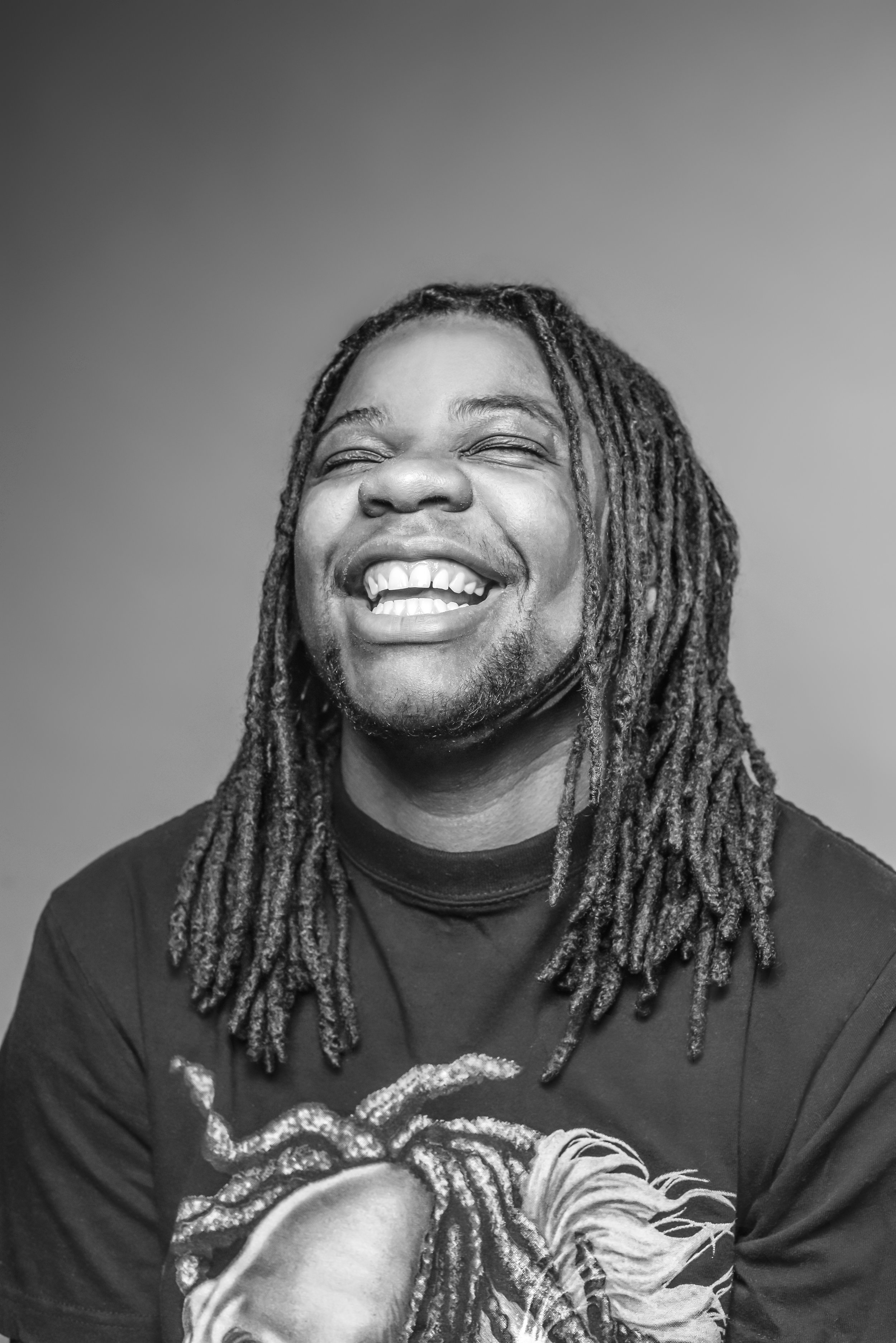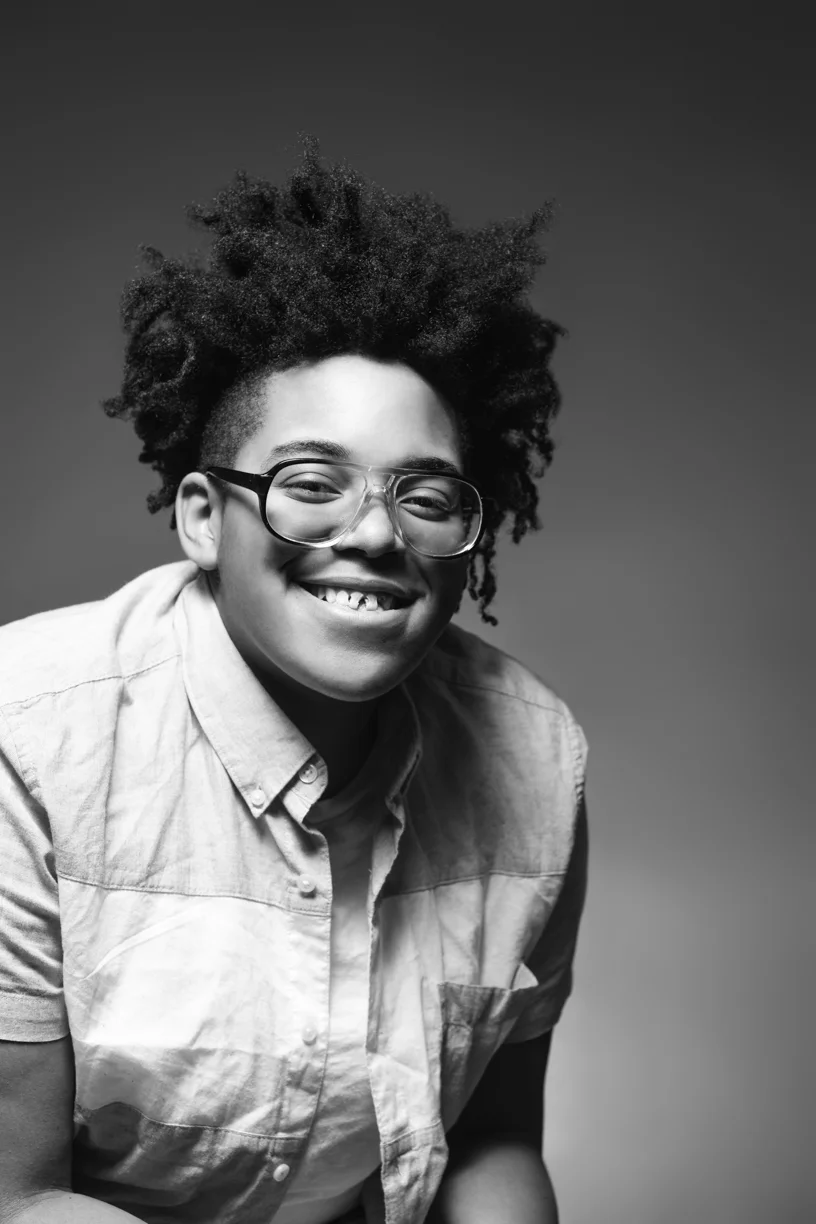


How Giovonni Santiago lives fabulously, navigates the politics of his identity, and makes his family proud.
When you talk to Giovonni Santiago, you have his full attention. He’s old school that way.
He doesn’t believe in hesitation, and he doesn’t believe in wasting time. He has a firm handshake, a sweet smile, and a voice thick with conviction. This morning, his locs are tied up at the base of his neck, and he doesn’t bother ordering a coffee.
Giovonni is a United States Air Force Veteran, a community organizer, and an activist and transgender rights advocate. He has a big life, but when we meet for coffee, I can tell he believes in the power of the small stuff. Like an outfit that speaks his truth in every stitch.
“Nike released these Air Max 1’s for Latin History Month,” he tells me, tilting one heel to catch the light. “And this,” he says, running one palm across his chest, “is a lion.”
Really, it’s half a lion—the image of Bob Marley’s face spliced into the other side—the lion’s mane and Marley’s locs tangled in a mess of symbol and power.
Giovonni knows that power well. It’s built into his framework. He tells me he was prepared for this kind of life—for all the speaking dates and interviews and advisory boards. His family, he says, shaped him with intention.
When Giovonni talks about his family, he breathes gratitude into every syllable. His parents and grandparents and aunts and uncles: they all crafted him with love and purpose—a gift and a responsibility he doesn’t shoulder lightly.
Giovonni’s family furnished his mind. And they taught him to perform real, messy, exhausting service—the kind of thing that gets your nails dirty, and earns you a good night's sleep.
Giovonni is the oldest of ten siblings; the son of an elementary school teacher. His sisters are social workers, 911 dispatchers, and victim's advocates. “We all have this strain,” Giovonni says. “We all have that desire to help other people.”
A lifelong public servant and community organizer, Giovonni’s great-grandfather taught him the value of a public persona, and, conversely, the value in always keeping some part of himself tucked away from the world—to always be both guarded and authentic; private and transparent; joyful and prudent.
Giovonni’s family encouraged him to see the world, and then prepared him for it. By the time he joined the U.S. Air Force, Giovonni could blend to match anything.
When I ask him if he’s ever overwhelmed by the hugeness of his purpose—or by the legacy of service he’s inherited—he just shrugs.
“My grandparents taught me that everything you do, you do it because you want to,” Giovonni says, flashing a handsome smile.
“That’s why I do it,” he tells me. “And I don’t expect anything in return.”
Giovonni only has an hour to spare. He has to be in Kent by noon to give a lecture, but he tells me he’s used to the momentum. He’s a man on the move.
"I'm all about action," Giovonni tells me. "I'm just a do-er.”
Two weeks ago, he flew to D.C. to give a lecture on his experience as a transgender veteran. He’s facilitated support groups, worked with his primary care physician to open the country’s first transgender-specific clinic in the VA system, and sat on Summit County’s Advisory Council for Diversity and Inclusion—representing the nonprofit he funds and founded himself.
When he was in the military, Giovonni identified both as a “minority female” and an LGBTQ+ person. He served almost four years under the Don’t Ask, Don’t Tell directive, navigating the legal and cultural boundaries of military service under the constant risk of investigation and discharge.
At times, he tells me, it was exhausting, or demoralizing, to face constant microaggressions or discriminatory treatment from superiors.
It really doesn’t matter to me what anyone else thinks or feels about me. Once you reach that place, you don’t have to worry about anything else. It's the most amazing feeling.
We all claim and live out multiple identities:
Race, religion, gender, nationality, ethnicity, gender identity, sexual orientation, level of education, socioeconomic status, age, and ability are all individual identities that help determine how each of us might experience the world.
And Giovonni’s experience of military culture was dependent on the intersection of his racial and ethnic identities, his gender identity, and his sexual orientation.
Now, for the most part, Giovonni lives stealth—meaning, he moves through the world passing as a man who was assigned male at birth. “In my daily life,” he tells me, “it defeats my purpose in living my truth if I still have to identify as something alternate.”
Living stealth is both a decision to uphold his personal truth, and a decision rooted in safety. Giovonni is doubly affected by racism and transphobia, which makes him particularly vulnerable to harassment, violence, and discrimination.
“I’m the fly drowning in the milk,” he tells me, talking with his hands. “Everyone around me is the milk. They’re non-veterans, or white people, or cisgender people. They just can’t see how the fly is struggling.”
Giovonni came up with this himself. It’s his way of illustrating privilege and oppression, and he uses it when he gives lectures on his personal experience.
“I do well for myself," he tells me, "but I'm still drowning.”
That’s where much of Giovonni’s work lies: in explaining to the milk why the fly is drowning. And in creating dialogue about the complexity of those identities, and the privilege and discrimination that accompany them.
Because Giovonni is a person of color, he’s more vulnerable to systemic violence than his white peers. He’s more likely to experience discrimination in housing and job markets, as well as in health care and education systems. If he’s outed as a trans person, the numbers are even worse.
Giovonni’s also more likely to experience excessive force at the hands of law enforcement than his white counterparts. And if he’s outed as a trans person, his chances of experiencing physical violence at the hands of the police nearly double.
Giovonni sighs, tired under the weight of constant explanation. Safety, he tells me, is a kind of systemic privilege. Something that can’t be bought or earned.
“If I go out in Fairlawn and I’m shot and killed by the cops,” he says, “what story will they tell?”
In the pale light of a fall morning, in the bustle of the coffee shop, he already knows the answer.
“I’ll be reduced,” he says, “to everything that doesn’t embody me as a person.”
Still considering his own death, Giovonni wonders out loud: “Will they say I was an honorably discharged veteran who ran a nonprofit?”
He stops, throwing his hands up in front of his chest. “They won’t,” he says. “They’ll just say I’m one more black trans person—dead.”
“It is so much harder to be an LGBTQ+ person of color than it is to be a white person who identifies someplace on the spectrum. And that comes from our cultures,” Giovonni says. “And that comes from our families.”
Giovonni identifies, first and foremost, as Afro-Latinx. And he tells me the culture of his family was, and still is, traditional, and reserved. In Afro-Latinx cultures, he says, gendered ideologies tend to be rigid. And his family was no exception to that commonality.
“Black and brown people are very private,” Giovonni tells me. “It’s very much this idea of, 'Well, that’s fine if that’s how you are, but why do you have to tell the whole world?'"
Giovonni tells me he’s learned to meet people where they are, and accept what they’re able to give. He tells me he revels in the little victories—like last year, when his dad started referring to him publicly as his son.
“I couldn’t do backflips,” he says. “But I totally wanted to do backflips.”
For people whose gender identities don’t align with the gender assigned to them at birth, early experiences of gendered expectations can be intense and painful. And Giovonni’s experience is no exception.
Playing house, he wanted to be the brother, the father, and the uncle. “I just knew something was missing,” he tells me. “I would put a bean bag in my pants because I thought that would fix things.”
That early sense of incompleteness is a common one among trans and gender non-conforming people. But Giovonni doesn’t talk much about his own experience with dysphoria. He tells me he lives in the present, and that’s firmly in his past.
Now, his nieces and nephews are his biggest advocates. They know him only as their Uncle Boo, and they never let the grown-ups forget who he is.
Recently, Giovonni’s nephew found an old photo of him. “That’s Uncle Boo when he used to be a girl,” he told his mother.
Stunned that he’d deduced this on his own, Giovonni’s sister told him it was true; that Uncle Boo had looked like a girl, but that was a long time ago.
Later, watching TV on the couch, Giovonni asked his nephew if the photo bothered him.
“No,” his nephew said. “Because you’re a boy now. And you’re the best uncle ever.“
Cartoons flashed in an endless loop on the glass screen.
“But, Uncle Boo,” his nephew said, after a few minutes of silence. “Are we still best friends?”
“Of course we are,” Giovonni told him.
“Good,” said his nephew. “Because I really love you.”
Giovonni rents a small office space. He tells me he gets donations from friends just to keep the lights on.
“I got tired of seeing kids commit suicide,” he says. “I wanted to help, so I went to support groups and I gave advice. But it wasn’t enough.”
After years of watching kids slip through the cracks, Giovonni started his own nonprofit called META: Motivate, Educate, Transform, Advocate. It provides trans, non-binary, and gender non-conforming teens and young adults with access to resources and support networks.
Giovonni puts in double days after working long hours at another job. He tells me he does it because he never had to worry about being homeless growing up; because he never had to worry where his next meal would come from.
“I saw my grandparents and my parents be successful,” he tells me. “So I knew that could happen for me.”
But not all young LGBTQ+ people of color are so lucky. They don’t often see power and grace and success reflected in their own image. Giovonni wants to change that.
“My visibility shows them that they have a voice and a brain,” Giovonni says. “It shows that they have support.”
In spite of Giovonni’s efforts to help trans youth of color gain access to health care, housing, educational opportunities, and support networks through META, there aren't many young people of color in his programs.
“They’re not showing up because there’s a lack of trust,” he tells me. “And if they do come, there’s a stigma. They feel that if they do come, they’ll be judged for their appearances, their dialects, how they carry themselves.” Giovonni sighs, exhausted even by the explanation of this painful cycle.
“When they're already broken so far down,” he says, “even when they see someone that looks like them—someone they can relate to—it’s hard, even for that person, to build them back up again.”
Giovonni tells me he sees white LGBTQ+ people struggling to get out of their own way in support groups and LGBTQIA+ organizations. He tells me they often fail to address the lived realities of people of color.
“I have to remind them that not everything is about them,” he says. “Not in a way that invalidates their transitions, or their identities, but in a way that speaks to the fact that certain people have more privilege than others.”
“It’s important to talk about that,” Giovonni tells me, “especially when we’ve got Caitlyn Jenner as part of the mainstream narrative about transgender people.”
Giovonni is looking to deconstruct the complex intersections of privilege and oppression. He’s willing to ask the hard questions. And sometimes, that means things get a little messy.
“I love to have those uncomfortable conversations,” he says. “I don’t care if it’s with another person of color, or another LGBTQ+ person. I’m going to call you out on your shit.”
“Everyone’s transition is important, but so is the process. I catch a lot of flack in the community,” Giovonni says with a shrug. “But I only say what I believe.”
Giovonni believes young trans, non-binary, and gender non-conforming folks should have to wait for access to certain trans-specific health care, and even work to pay for some of that care themselves.
“People think transitioning will fix other issues in their life,” Giovonni says. “And it just doesn’t.”
“If someone is saying, I think I might be trans, and then three months later are having top surgery, they’re missing an important part of the process,” Giovonni explains. “I’m not opposed to the mandated year of counseling. I think that’s very much needed.”
Those few sentences have made Giovonni unpopular in many circles. Because they exist in stark opposition to many advocacy efforts.
Most LGBTQIA+ folks assert that gatekeeper medical standards for transitioning—like that mandatory year of therapy before HRT—cost trans people their lives.
Many trans and gender non-conforming people are denied the medical permission and health coverage needed to receive trans-specific health care. Often, trans and gender non-conforming people attempt suicide while waiting for access to care.
They die jumping through that impossible, and sometimes humiliating, set of hoops; stuck in an endless game to prove their identities are valid before they're able to access the kind of care they desperately need.
But Giovonni tells me he believes in the entire process, however unpopular that might make him. And that, in itself, is part of who Giovonni really is. He always has something to say. And he's always willing to take the heat.
All Homeless Youth
Homeless LGBTQ+ Youth
Homeless Transgender Youth
If you are homeless, or at risk of becoming homeless, in Portage or Summit Counties, CANAPI may be able to help.
More than 78% of transgender and gender non-conforming students in grades K-12 report having experienced harassment or violence in school. More than 15% of those are forced to drop out.
When kids are forced to drop out of school as a result of harassment or violence, they're more likely to attempt suicide and to experience homelessness.
Homeless trans and gender non-conforming youth are more likely to experience sexual assault and incarceration. They are also more likely to attempt suicide, struggle with addiction, lack access to affordable health care, and participate in dangerous underground economies.
Trans and gender non-conforming people of color are more likely to experience poverty, homelessness, addiction, harassment, sexual assault, incarceration, and discrimination in housing and job markets than their white trans and gender non-conforming peers.
Trans and gender non-conforming people of color exist at the intersections of four distinct modes of systemic violence: transphobia, transmisogyny, racism, and homophobia.
They experience harassment, discrimination, and violence based both on their racial and ethnic identities, and their gender identities and expressions. They are doubly, sometimes triply, affected by systems of violence that leave them deeply vulnerable.
Giovonni doesn't smile when he tells me he's running for City Council. He is fixed and deliberate.
"I just want to serve and make a change," he tells me. He just wants to mobilize that legacy of real, messy service his family built up inside of him.
After helping Akron United get a non-discrimination ordinance passed in the spring of 2017, Giovonni ended up at a meeting, going back and forth with City Council members on the details of the ordinance.
People of color aren’t adequately represented in City Council. And Giovonni decided it was time for that to change.
When LGBTQIA+ people of color see themselves reflected in positions of power and leadership, they're able to see past the immediate and exhausting struggle of oppression.
They’re able to envision themselves there too; able to thrive and grow in a world that so often seeks to brutalize or erase them.
"People need to know that there are young people of color on the LGBTQ+ spectrum—people who look like me, and feel like me, and talk like me—who are not only capable of running for these positions, but capable of winning them.”
Giovonni lays out those politics in detail: Trans people of color are here, and have always been here; organizing our movements, performing acts of service, wrapped up in the fierce fight for survival and liberation. That political legacy is inescapable, so Giovonni is learning to embrace it.
"The time to change things is now," he says, backlit by the dull cloud-cover outside the window. He pulls off his jacket, wearing the t-shirt with Marley and a lion underneath; his full self wrapped up in this single image of duality.
When I ask him if he's nervous about the idea of making himself vulnerable to public scrutiny, he doesn't hesitate.
"I'm not nervous,” he says, turning away, blinking in the light from the window. His lips split into that handsome smile, the breath and pride of his parents and grandparents and great-grandparents in him too.
“I know who I am,” he says. “And I am afraid of nothing.”
Explore Other Stories
Statistics courtesy of: Injustice at Every Turn: A Report of the National Transgender Discrimination Survey, Seeking Shelter The Experiences and Unmet Needs of LGBT Homeless Youth, Serving Our Youth: Findings from a National Survey of Service Providers Working with LGBT Youth, True Colors Foundation, Jumping Beyond the Broom: Why Black and Transgender Americans Need More Than Marriage Equality, The State of Gay and Transgender Communities of Color in 2012
Founded in 2001, the mission of the Gay Community Endowment Fund is to advance a lived equality for all LGBTQ+ people in Greater Akron. The fund accepts grant applications for programs that benefit the local LGBTQ+ community and Greater Akron as a whole. It also advocates for issues vital to the health and well-being of the LGBTQ+ community and promotes systemic change that advances the LGBTQ+ community toward a future of full inclusion and equity. The Gay Community Endowment Fund is a permanent philanthropic endowment of Akron Community Foundation. Learn more at www.gaycommunityfund.org.









